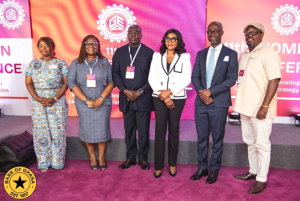Business
Women’s innovation drives organisational survival- BoG Second Deputy-Governor
By Sandra Agyeiwaa OTOO The Bank of Ghana Second Deputy-Governor, Matilda Asante-Asiedu, has noted that elevating women beyond human resource roles is about competitiveness and survival, not charity or tokenism – adding that when women innovate, organisations leap forward. “The truth is th...
B&FT
published: Sep 01, 2025

By Sandra Agyeiwaa OTOO
The Bank of Ghana Second Deputy-Governor, Matilda Asante-Asiedu, has noted that elevating women beyond human resource (HR) roles is about competitiveness and survival, not charity or tokenism – adding that when women innovate, organisations leap forward.
“The truth is this: when women innovate organisations do not just evolve, they leapfrog. Elevating women beyond HR is not about charity. It is not about tokenism. It is about competitiveness and survival in a fast-changing world,” she said.
She made this assertion at the 11th Women in Human Resource (HR) Conference in Accra, held under the theme ‘Beyond HR – elevating women to lead culture, strategy and innovation’.

According to her, McKinsey research indicates that companies with stronger gender diversity are 25% more profitable, while Harvard Business Review shows women outperform men in resilience, integrity and initiative qualities needed in uncertain times.
She added that the case extends beyond business, as empowering women strengthens families, communities and economies.
“McKinsey’s research is clear: companies in the top quartile for gender diversity are 25% more likely to outperform their peers on profitability. The Harvard Business Review also finds that women score higher than men in key leadership competencies such as resilience, integrity and taking initiative, the very qualities organisations need in turbulent times. But the case is not just corporate, it is also social,” she stated.
Mrs. Asante-Asiedu added: “Across Africa, women reinvest up to 70% of their income back into families and communities, compared to about 40% for men. This means that when women rise, entire households rise, communities are strengthened and economies become more resilient. The truth is simple: when women thrive, economies thrive. And when women are allowed to lead – not just in HR but also culture, strategy, and innovation – the impact multiplies for everyone”.
She also asserted that women must confidently claim their leadership roles rather than wait for validation. Leadership, she noted, is not granted but taken – adding that when spaces are limited, women should have the courage to expand opportunities by building bigger tables and ensuring others are included in the process.
She challenged boards of directors to ensure appointments go beyond symbolism, stressing that women must be represented on key committees such as audit, risk, finance and innovation. She warned that without women in these spaces, organisations lose half of society’s wisdom. Real progress, she added, requires women as equal decision-makers.
“For boards, appointments must be intentional – not symbolic. Women cannot be confined to the so-called ‘soft committees’. The future of organisations is shaped in audit, risk, finance and innovation committees. If women are absent there, then half of society’s wisdom is absent where it matters most. True progress requires that women are not tokens in the room but equal voices at the decision-making table,” she stressed.
She continued by urging organisations to shift from mentorship to sponsorship; stressing that while guidance is useful, advocacy transforms careers. Women, she said, need leaders who will champion them, open doors and provide opportunities. Mentors offer advice, but sponsors grant access and without access women’s talent remains hidden and underutilised.
Addressing society, Mrs. Asante-Asiedu noted: “We must understand that inclusivity is not about pushing men aside, it’s about partnership. Men remain anchors in families and organisations and policies that exclude them miss the point. But imagine this: if every woman in a man’s life, his wife, his mother, his sister, his daughter earned equally and led equally, how different would our homes be?”
The future of leadership depends on women being present at decision-making tables where culture is influenced, strategy developed and innovation driven. Ghana’s Affirmative Action Act, 2024, provides a roadmap for gender parity: 30% by 2026, 35% by 2028 and 50% by 2030 in line with Sustainable Development Goal 5.
However, this vision will not happen by chance. It demands women’s readiness to claim their space, boards’ commitment to creating opportunities and society’s acceptance of inclusion as a necessity, not a choice.
She concluded by stressing that leadership is not male or female but human; built on balance, vision, courage and empathy. Women, she said, bring a unique blend of purpose and innovation, shaping strategy with empathy and driving inclusive change.
The post Women’s innovation drives organisational survival- BoG Second Deputy-Governor appeared first on The Business & Financial Times.
Read More